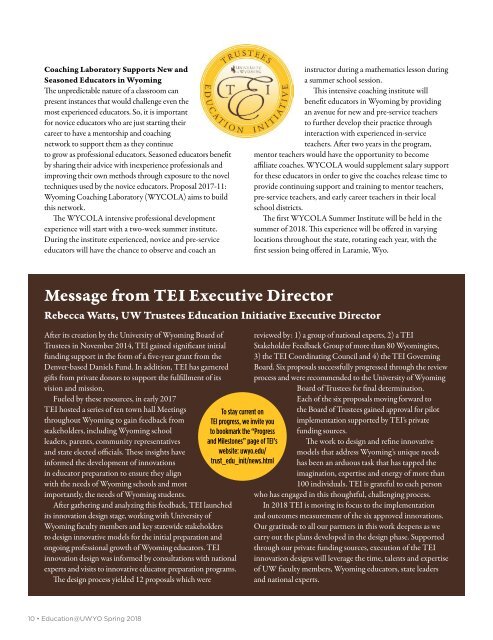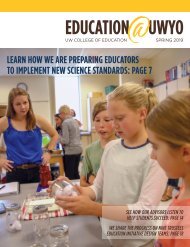University of Wyoming College of Education Spring 2018
Magazine for the University of Wyoming College of Education.
Magazine for the University of Wyoming College of Education.
You also want an ePaper? Increase the reach of your titles
YUMPU automatically turns print PDFs into web optimized ePapers that Google loves.
Coaching Laboratory Supports New and<br />
Seasoned Educators in <strong>Wyoming</strong><br />
The unpredictable nature <strong>of</strong> a classroom can<br />
present instances that would challenge even the<br />
most experienced educators. So, it is important<br />
for novice educators who are just starting their<br />
career to have a mentorship and coaching<br />
network to support them as they continue<br />
to grow as pr<strong>of</strong>essional educators. Seasoned educators benefit<br />
by sharing their advice with inexperience pr<strong>of</strong>essionals and<br />
improving their own methods through exposure to the novel<br />
techniques used by the novice educators. Proposal 2017-11:<br />
<strong>Wyoming</strong> Coaching Laboratory (WYCOLA) aims to build<br />
this network.<br />
The WYCOLA intensive pr<strong>of</strong>essional development<br />
experience will start with a two-week summer institute.<br />
During the institute experienced, novice and pre-service<br />
educators will have the chance to observe and coach an<br />
Message from TEI Executive Director<br />
Rebecca Watts, UW Trustees <strong>Education</strong> Initiative Executive Director<br />
After its creation by the <strong>University</strong> <strong>of</strong> <strong>Wyoming</strong> Board <strong>of</strong><br />
Trustees in November 2014, TEI gained significant initial<br />
funding support in the form <strong>of</strong> a five-year grant from the<br />
Denver-based Daniels Fund. In addition, TEI has garnered<br />
gifts from private donors to support the fulfillment <strong>of</strong> its<br />
vision and mission.<br />
Fueled by these resources, in early 2017<br />
TEI hosted a series <strong>of</strong> ten town hall Meetings<br />
throughout <strong>Wyoming</strong> to gain feedback from<br />
stakeholders, including <strong>Wyoming</strong> school<br />
leaders, parents, community representatives<br />
and state elected <strong>of</strong>ficials. These insights have<br />
informed the development <strong>of</strong> innovations<br />
in educator preparation to ensure they align<br />
with the needs <strong>of</strong> <strong>Wyoming</strong> schools and most<br />
importantly, the needs <strong>of</strong> <strong>Wyoming</strong> students.<br />
After gathering and analyzing this feedback, TEI launched<br />
its innovation design stage, working with <strong>University</strong> <strong>of</strong><br />
<strong>Wyoming</strong> faculty members and key statewide stakeholders<br />
to design innovative models for the initial preparation and<br />
ongoing pr<strong>of</strong>essional growth <strong>of</strong> <strong>Wyoming</strong> educators. TEI<br />
innovation design was informed by consultations with national<br />
experts and visits to innovative educator preparation programs.<br />
The design process yielded 12 proposals which were<br />
To stay current on<br />
TEI progress, we invite you<br />
to bookmark the “Progress<br />
and Milestones” page <strong>of</strong> TEI’s<br />
website: uwyo.edu/<br />
trust_edu_init/news.html<br />
instructor during a mathematics lesson during<br />
a summer school session.<br />
This intensive coaching institute will<br />
benefit educators in <strong>Wyoming</strong> by providing<br />
an avenue for new and pre-service teachers<br />
to further develop their practice through<br />
interaction with experienced in-service<br />
teachers. After two years in the program,<br />
mentor teachers would have the opportunity to become<br />
affiliate coaches. WYCOLA would supplement salary support<br />
for these educators in order to give the coaches release time to<br />
provide continuing support and training to mentor teachers,<br />
pre-service teachers, and early career teachers in their local<br />
school districts.<br />
The first WYCOLA Summer Institute will be held in the<br />
summer <strong>of</strong> <strong>2018</strong>. This experience will be <strong>of</strong>fered in varying<br />
locations throughout the state, rotating each year, with the<br />
first session being <strong>of</strong>fered in Laramie, Wyo.<br />
reviewed by: 1) a group <strong>of</strong> national experts, 2) a TEI<br />
Stakeholder Feedback Group <strong>of</strong> more than 80 <strong>Wyoming</strong>ites,<br />
3) the TEI Coordinating Council and 4) the TEI Governing<br />
Board. Six proposals successfully progressed through the review<br />
process and were recommended to the <strong>University</strong> <strong>of</strong> <strong>Wyoming</strong><br />
Board <strong>of</strong> Trustees for final determination.<br />
Each <strong>of</strong> the six proposals moving forward to<br />
the Board <strong>of</strong> Trustees gained approval for pilot<br />
implementation supported by TEI’s private<br />
funding sources.<br />
The work to design and refine innovative<br />
models that address <strong>Wyoming</strong>’s unique needs<br />
has been an arduous task that has tapped the<br />
imagination, expertise and energy <strong>of</strong> more than<br />
100 individuals. TEI is grateful to each person<br />
who has engaged in this thoughtful, challenging process.<br />
In <strong>2018</strong> TEI is moving its focus to the implementation<br />
and outcomes measurement <strong>of</strong> the six approved innovations.<br />
Our gratitude to all our partners in this work deepens as we<br />
carry out the plans developed in the design phase. Supported<br />
through our private funding sources, execution <strong>of</strong> the TEI<br />
innovation designs will leverage the time, talents and expertise<br />
<strong>of</strong> UW faculty members, <strong>Wyoming</strong> educators, state leaders<br />
and national experts.<br />
Writing Fellows Increase<br />
Academic Publications<br />
Written by: Alli Barker<br />
The <strong>University</strong> <strong>of</strong> <strong>Wyoming</strong>’s <strong>College</strong> <strong>of</strong> <strong>Education</strong> Academic<br />
Writing Fellows Initiative was created with intention to<br />
foster an environment that promotes academic writing and<br />
to encourage faculty to write for high-quality publications.<br />
The program was conceptualized by Interim Writing Center<br />
Director Rick Fisher and Endowed Chairs <strong>of</strong> Literacy<br />
<strong>Education</strong> Cynthia Brock and Victoria Gillis, during the<br />
spring <strong>of</strong> 2017. The program was run by Brock and <strong>Wyoming</strong><br />
Excellence in Higher <strong>Education</strong> Endowed Chair in Literacy<br />
<strong>Education</strong>, Leigh Hall, during the 2017-18 academic year.<br />
“Even though writing <strong>of</strong>ten feels like solitary and isolating<br />
work, the notion <strong>of</strong> writing fellows seemed like a good way<br />
to recognize the value <strong>of</strong> a social community to help support<br />
and advance writing,” says Fisher.<br />
The Academic Writing Fellows Program focuses on the<br />
promotion <strong>of</strong> academic writing and furthers collegiality<br />
within the <strong>College</strong> <strong>of</strong> <strong>Education</strong>. The goal <strong>of</strong> the initiative is<br />
to provide support to fellows who wish to establish a regular<br />
habit <strong>of</strong> producing high-quality academic writing.<br />
“Academic writing is one <strong>of</strong> the cornerstones <strong>of</strong> our work as<br />
pr<strong>of</strong>essors,” says Brock. “Developing a culture <strong>of</strong> high-quality<br />
academic writing is <strong>of</strong> crucial importance for any college or<br />
university.”<br />
To promote high-quality academic writing, nine fellowship<br />
members, both doctoral students and <strong>College</strong> <strong>of</strong> <strong>Education</strong><br />
faculty, receive mentorship from expert writers across the<br />
country. The mentorship allows participants to improve<br />
research work and the presentation <strong>of</strong> writing.<br />
Along with mentorship from writing experts throughout<br />
the nation, fellowship members meet with their colleagues to<br />
develop a plan for writing journal articles that are submitted<br />
to a top-tier scholarly journals. Writing fellows meet weekly in<br />
small writing groups to support one another in their writing<br />
by debriefing works-in-progress or providing guidance when<br />
needed.<br />
“Through participation in the program I have redefined<br />
who I am as a scholarly writer,” School <strong>of</strong> Teacher <strong>Education</strong><br />
Associate Pr<strong>of</strong>essor Alan Buss says. “Interactions with<br />
phenomenal colleagues have fueled this change, as I’ve<br />
seen how they wrestle with and overcome the same issues<br />
I privately thought were my own, unique hang-ups.”<br />
Pictured left to right: Gabe Swarts, assistant pr<strong>of</strong>essor; Karen Cloud,<br />
assistant lecturer; Dana Robertson, LRCC executive director and assistant<br />
pr<strong>of</strong>essor; Ana Houseal, associate pr<strong>of</strong>essor; Kate Muir Welsh, associate<br />
pr<strong>of</strong>essor; Tao Han, associate pr<strong>of</strong>essor; Toby Holmes, assistant pr<strong>of</strong>essor;<br />
and Alan Buss, associate pr<strong>of</strong>essor. PHOTO COURTESY OF CYNTHIA BROCK<br />
Another fellow, Executive Director <strong>of</strong> the Literacy<br />
Research Center and Clinic Dana Robertson, shares the many<br />
successes he has had within the program, “With the support<br />
<strong>of</strong> this process over the last year, I have secured one top-tier<br />
publication, a second under review and two more in progress<br />
towards submission.”<br />
At the end <strong>of</strong> the spring <strong>2018</strong> semester, the fellows have<br />
experienced many successes thus far, including: two books<br />
accepted or published, five book chapters accepted or<br />
published, 12 grants submitted or funded, 17 Q1 journal<br />
manuscripts submitted, published or under review and eight<br />
practitioner articles submitted, published or under review.<br />
The Academic Writing Fellows will continue their<br />
program for another year further developing a college ethos<br />
that promotes high-quality academic writing and publishing.<br />
“The opportunity to collaborate with committed faculty<br />
and a supportive dean was a really exciting part <strong>of</strong> this<br />
project,” Fisher states. “I hope that it is possible to make this<br />
opportunity a sustainable experience for others in the <strong>College</strong><br />
<strong>of</strong> Ed.”<br />
The Academic Writing Fellows Initiative serves to promote<br />
and increase in high-quality academic writing. The fellows<br />
are determined, as Brock explains, “to continue to grow<br />
and expand the culture <strong>of</strong> producing high-quality academic<br />
writing in the <strong>College</strong> <strong>of</strong> <strong>Education</strong>.”<br />
10 • <strong>Education</strong>@UWYO <strong>Spring</strong> <strong>2018</strong> <strong>Education</strong>@UWYO <strong>Spring</strong> <strong>2018</strong> • 11



